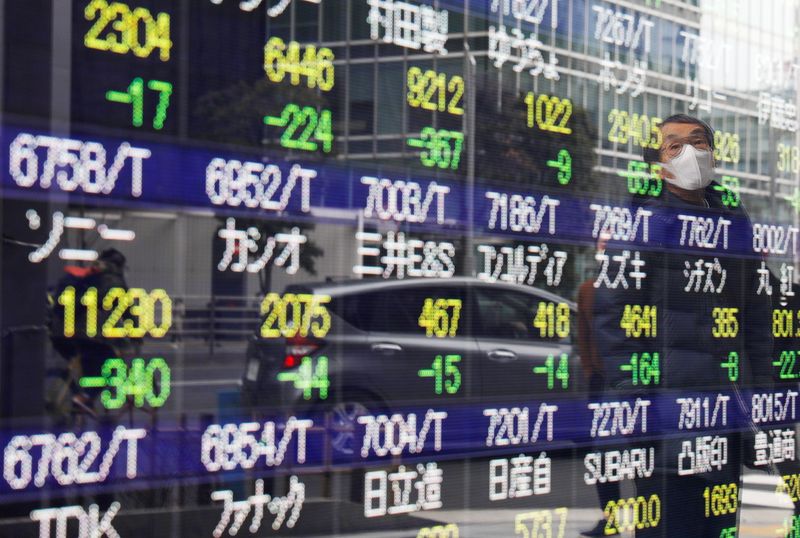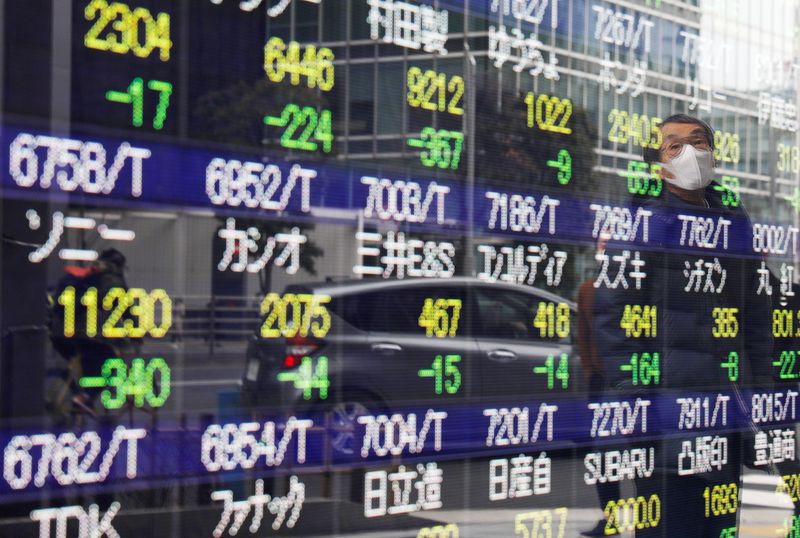By Tom Arnold and Alun John
LONDON/HONG KONG (Reuters) -Global shares edged further back from record highs on Tuesday as lofty sovereign bond yields and rising global COVID-19 cases had investors questioning high equity valuations.
With bond yields at elevated levels, the U.S. dollar remained under pressure, hitting its lowest in nearly seven weeks during the Asian session.
Europe's STOXX 600 was 0.6% weaker, with major indexes in Frankfurt, Paris and London all negative.
That followed a mixed showing in Asian equity markets as MSCI's broadest index of Asia-Pacific shares outside Japan added 0.2%, close to its highest level since March. But Japan's Nikkei dropped 2% on worries that the possible reintroduction of COVID-19 emergency measures in the country's biggest cities would slow the economic recovery.
India reported 1,761 deaths from COVID-19 overnight, its highest daily toll, with large parts of the country now under lockdown, as the country battles a second wave.
"Markets are struggling to ascertain in which direction the next major move is," said James Athey, investment director at Aberdeen Standard Investments.
"The reaction to very strong U.S. data in recent days will have seriously disappointed the bond bears, suggesting the good news is very much in the price. Against that, we still have vaccine concerns, a rapidly spreading virus and potential tax increases which have yet to be fully recognised and absorbed."
The MSCI world equity index, which tracks shares in 49 countries, was 0.1% weaker, slipping further back from record highs scaled on Monday.
E-mini futures for the S&P 500 rose 0.2%, pointing to an equity recovery in the United States after major Wall Street indexes on Monday drew back from record highs hit list week, dragged by shares of Tesla Inc.
The electric-car maker slid 3.4% after a Tesla vehicle believed to be operating without anyone in the driver's seat crashed into a tree on Saturday north of Houston, killing two occupants.
The yield on benchmark 10-year Treasury notes rose to 1.6227%, up from its U.S. close of 1.599%, and at similar levels reached on Thursday, but below their March spikes.
The latest data from the United States has pointed to a robust recovery from the pandemic. U.S. homebuilding surged to nearly a 15-year high in March, showed data on Friday.
Euro zone bond yields extended their gains, but trading was relatively contained as focus turns to the European Central Bank meeting on Thursday, which investors hope will give more clarity about stimulus plans for the bloc.
Germany's 10-year yield rose above Monday's peak to a new high since early February at -0.215% at the session open, before dipping below that level.
In currency markets, the dollar continued its recent weakness. The dollar index was down 0.1% at 90.952, having hit a low of 90.877 during Asian trading.
The euro was up 0.3% at $1.2065, its highest in nearly seven weeks.
The risk friendly Aussie rose as much as 0.6% against the greenback to reach a one-month high, partly due to upbeat remarks from Australian central bank.
"In our view, USD can remain heavy this week as focus shifts from U.S. economic outperformance to the improving global economic outlook more broadly," analysts at CBA wrote in a research note.
The weak dollar helped push up commodity prices.

U.S. crude and Brent both gained more than 1%, with the former at $64.04 barrel, and the latter at $67.90 barrel. Three-month London copper traded just shy of its highest level since August 2011.[O/R]
Spot gold rose 0.1% to $1,769 per ounce. [GOL/]
